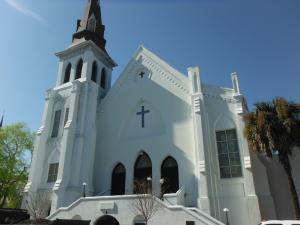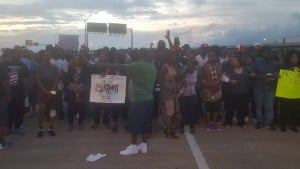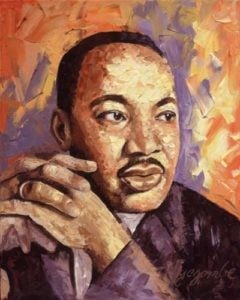*Below is a portion of the sermon I preached Sunday in response to the terrorism that happened in Charleston, South Carolina at Emanuel AME Church.
They finally got a chance to see the person who has forever changed the trajectory of their lives. Although not in person but via video link, they got to a chance to see up close the face of American terror. They got a chance to look into his eyes and to see evil up close as they possibly could on that day. The man who has and apparently continues to drink from the fountain of neo-confederate ideology and theology; the man who believes that black men just go around raping white women; the man who believes that black folks are taking over his country; the man who walked into a bible study on one Wednesday night, sat and prayed with the folks for an hour; that man then got up and killed just about everybody in the room. The got to see that man, Dylann Roof, the racist, the terrorist; the neo-confederate; they got to see him up close for the first time.
But not only did these people get to see a personification of neo-confederate evil in Dylann Roof, but they also got to see and hear from Judge James Gosnell. In what was supposed to be a bond hearing, in which the judge just renders bond, he felt as if he needed to make a statement. In front of these grieving people and millions of Americans who were watching and grieving as well, he, with vim and vigor, with volition and conviction reminded us that “We have victims — nine of them. But we also have victims on the other side. There are victims on this young man’s side of the family. Nobody would have ever thrown them into the whirlwind of events that they are being thrown into.” Then he closed by saying, “We must find it in our hearts at some point in time, not only to help those that are victims but to also help his family as well. So not only did the family had to sit there and see the face of American terror on the video link, they were in the courtroom with a judge who arguably had more empathy; more sympathy for the family of the terrorist—and by extension, the terrorist himself, than for the family members of the ones that were killed.
But something remarkable happened. When the judge finally gave them an opportunity to speak to the man that killed their loved ones; almost to a person, they offered forgiveness. Now mind to, this was Friday afternoon and the shooting happened Wednesday night. So under 48 hours, these family members of the loved ones who were shot down with a 45; who were shot multiple times as he reloaded they estimate up to 5-7 times; with bullets that can tear limbs off bodies; these folks had it in them to offered this terrorist forgiveness.
And after hearing this, many people in the press remarked how these people were able to moved forward despite the horror visited upon their families. Even President Obama tweeted, “In the midst of darkest tragedy, the decency and goodness of the American people shines through in these families.” This forgiveness was celebrated throughout the day and late until the evening, with many believing that we need to take our cues from these family members; forgive and move on to forge a better Charleston. But more importantly that that, these family members exemplified what it meant to be Christian; to be Christian is to forgive so we can move forward.
However, if we are honest with ourselves, our forgiveness level isn’t that high. Matter of fact, for some of us, we could not have been in the courtroom that day and if so, they would have had the censor button on us. In short, for many of us, our capacity to forgive is not that quick. We want to, we mean to, we feel as if we need to, we are Christians and we know the word, “forgive others as I have forgiven you,” so we want to forgive, but our ability to forgive like the loved ones of the Charleston Nine, is simply not that strong.
And truth be told, for some of us, we may feel a little guilty in not forgiving like we think we should and we rush our forgiveness. However, there was someone did not rush his forgiveness. When he was done wrong, he did not say, “I forgive you,” to his tormentors and terrorists, but he said, “Father forgive them, for they do not know what they do.”
In other words, what if Jesus, at that moment, knowing that forgiveness maybe is the right thing to do; it’s the right thing to pronounce; but as he was hanging on the cross and thinking about all that has been done to him in the name of religion; in the name of faith; in the name of ideology; in the name of the Empire, what if Jesus could not find a way to articulate forgiveness at that particular moment, but instead, what if he had to turn it over to God? What if Jesus was trying to teach us the foundation of forgiveness?
What if Jesus was trying to demonstrate what to do when forgiveness is simply too hard? Father forgive them, because I can’t. Father forgive them, because I might just cuss. Father forgive them, because I might lose my mind up in here. Father forgive them, because I might call somebody and roll up on some folks. Father forgive them because this is some mess I can’t understand. Father forgive them, because I don’t know where to turn. Father forgive them because something may come out of me that I don’t want anyone to see. Father forgive them, because sometimes they know exactly what they are doing! By asking God to “forgive them,” what if Jesus was showing us what to do when we can’t forgive the hurt and pain that others have caused in our lives??
Andre E. Johnson is the Managing Editor and Founder of R3













